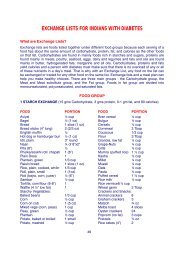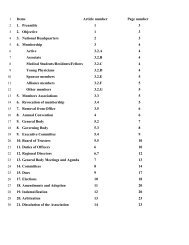functional medicine and nutritional genomics - American Association ...
functional medicine and nutritional genomics - American Association ...
functional medicine and nutritional genomics - American Association ...
You also want an ePaper? Increase the reach of your titles
YUMPU automatically turns print PDFs into web optimized ePapers that Google loves.
AAPI’S NUTRITION GUIDE TO OPTIMAL HEALTH: USING PRINCIPLES OF FUNCTIONAL MEDICINE AND NUTRITIONAL GENOMICS<br />
Stress, Reward Pathways <strong>and</strong> Eating<br />
It is well known that stress affects eating<br />
behaviors. Brain reward circuitry appears to play a<br />
key role in stress related food intake. A theoretical<br />
model of Reward Based Stress Eating has been<br />
proposed by researchers at the University of<br />
California, San Francisco Department of<br />
Psychiatry. xxxi<br />
According to this model, cortisol <strong>and</strong><br />
the reward circuitry affect motivation for calorically<br />
dense food intake. The reward value of food may<br />
be influenced by cortisol via<br />
neuroendocrine/peptide mediators such as insulin,<br />
leptin, <strong>and</strong> neuropeptide Y (NPY). Hence, the<br />
model also emphasizes the relationship between<br />
stress, eating, <strong>and</strong> potential neuroendocrine<br />
mediators. xxxi<br />
Stress, in addition to highly palatable food, can<br />
stimulate endogenous release of opioids. Opioid<br />
release appears to be part of the organism’s<br />
defense mechanism designed to protect from<br />
detrimental stress effects. This is done by reducing<br />
hypothalamic-pituitary-adrenal (HPA) axis activity<br />
<strong>and</strong> thereby attenuating the stress response.<br />
Stimulation of the reward circuits via the intake of<br />
highly palatable foods, stress induced stimulation of<br />
the HPA axis, or both, may lead to neurobiological<br />
adaptations that encourage overeating. xxxi<br />
Treating Obesity by Changing the Brain<br />
Most weight loss programs are not successful<br />
long-term. One reason may be due to the lack of<br />
attention given to the brain’s very powerful reward<br />
pathways. To improve success, it may be<br />
necessary to change reward circuitry that trigger<br />
cravings <strong>and</strong> drives to overeat highly palatable<br />
foods. Behavioral interventions that enhance<br />
dopamine function hold potential in the treatment<br />
of obesity.<br />
Breakthroughs in neuroscience show us that we<br />
can change our brain’s circuitry. We can literally<br />
choose to increase certain neural networks <strong>and</strong><br />
reduce others. A comprehensive behaviorally based<br />
program designed to ‚re-wire‛ the brain’s reward<br />
pathways can be an effective way to reduce food<br />
cravings <strong>and</strong> overeating. Although detailed program<br />
62<br />
design is beyond the scope of this article, a few<br />
suggestions will be made.<br />
� A variety of professionals might be involved<br />
(i.e., dietitian, physician, exercise physiologist,<br />
psychologist) <strong>and</strong> a variety of formats (online<br />
<strong>and</strong> phone support, individual consultations,<br />
group classes, etc.) might be incorporated.<br />
� Treatment should be individualized <strong>and</strong><br />
incorporate a variety of cognitive <strong>and</strong><br />
behavioral tools. These tools should help the<br />
individual: 1) decrease the reward value of<br />
the food or behavior; 2) increase the reward<br />
of the new positive behaviors; 3) reduce the<br />
power of triggers; <strong>and</strong> 4) strengthen new<br />
neural circuits by learning new habits. xxxii<br />
� Stress management tools should be<br />
incorporated daily to weaken neural circuits<br />
that promote stress. Increasing natural<br />
pleasures can help reduce stress <strong>and</strong> may<br />
improve dopamine function. Exercise is a well<br />
known natural pleasure, stress reducer, <strong>and</strong><br />
mood enhancer. This may be due to changes<br />
in neurotransmitter concentrations <strong>and</strong><br />
alterations in central neural activity. xxxiii<br />
Techniques such as mindfulness meditation<br />
have been found to increase activity in the left<br />
prefrontal cortex, which is associated with joy<br />
<strong>and</strong> peace. ix<br />
� Analysis of stimuli, situations, <strong>and</strong> cues that<br />
trigger out-of-control-eating is critical. This<br />
information can help the patient become aware<br />
of the unconscious cues or settings that drive<br />
overeating behaviors. xxxiv Avoidance of certain<br />
triggers or foods (i.e., refined sugar) may be<br />
necessary at least initially.<br />
Ingrained behaviors will not likely change without a<br />
significant amount of repetition. Cognitive <strong>and</strong><br />
behavioral tools must be practiced repeatedly if<br />
they are going to weaken the strong neural<br />
circuits that favor overeating.<br />
It is clear that to better treat the obesity epidemic<br />
we must unravel the neural mechanisms that<br />
process the hedonic effects of highly palatable<br />
foods, but also those that govern reward-learning,<br />
2012

















